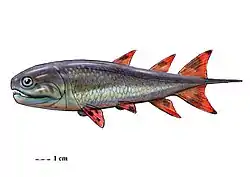Trachymetopon
Trachymetopon is an extinct genus of prehistoric coelacanth from the Early Jurassic Posidonia Shale of Germany and the Middle Jurassic of France. Only one species has been named, Trachymetopon liassicum, described by Henning in 1951 from an almost complete specimen found in the Lower Toarcian of Ohmden in Baden-Württemberg.[1] Another specimen is known from the same site, and two older specimens come from the Sinemurian of Holzmaden.[2] The holotype of this species is 1.6 metres (5 ft 3 in) in length.[2] A giant specimen of an undetermined species of Trachymetopon is known from the Middle Jurassic (Late Callovian) of Normandy. This specimen, composed of a 53 cm long palatoquadrate, belongs to an individual 4 metres (13 ft) in length.[3] A study published in 2015 revealed that this coelacanth belongs to the Mawsoniidae.[2] Trachymetopon is one of the few known mawsoniids to have been exclusively marine (with an indeterminate form from the Triassic of France), while most of the other members of the group have lived in fresh and brackish waters.[4]
| Trachymetopon | |
|---|---|
 | |
| Trachymetopon liassicum | |
| Scientific classification | |
| Kingdom: | |
| Phylum: | |
| Class: | |
| Family: | |
| Genus: | Trachymetopon |
| Species: | Trachymetopon liasicum |
Phylogeny
A phylogenetic analysis of the mawsoniids published in 2020 found a polytomy grouping together Trachymetopon and the Cretaceous genera “Lualabaea”, Axelrodichthys, and Mawsonia. The genus “Lualabaea” could be congeneric with Axelrodichthys.[5]
| |||||||||||||||||||||||||||||||||||||||||||||||||
See also
- Sarcopterygii
- List of sarcopterygians
- List of prehistoric bony fish
References
- Hennig, E. (1951). Trachymetopon liassicum, Ald., ein Reisen-Crossopterygier aus Schwäbischem Ober-Lias. Neues Jahrbuch für Geologie und Paläontologie, Abhandlungen, Stuttgart, 94, 67-79.
- Dutel, H.; Herbin, M.; Clément, G. (2015). "First Occurrence of a Mawsoniid Coelacanth in the Early Jurassic of Europe". Journal of Vertebrate Paleontology. 35(3): e929581. doi:10.1080/02724634.2014.929581.
- Dutel, H.; Pennetier, E.; Pennetier, G. (2014). "A Giant Marine Coelacanth from the Jurassic of Normandy, France". Journal of Vertebrate Paleontology. 34(5): 1239–1242. doi:10.1080/02724634.2014.838176.
- Deesri, U.; Cavin, L.; Amiot, R.; Bardet, N.; Buffetaut, E.; Cuny, G.; Giner, S.; Martin, J.E.; Suan, G. (2018). "A mawsoniid coelacanth (Sarcopterygii: Actinistia) from the Rhaetian (Upper Triassic) of the Peygros quarry, Le Thoronet (Var, southeastern France)". Geological Magazine. 155(1): 187–192. doi:10.1017/S0016756817000619.
- Cavin, L.; Buffetaut, E.; Dutour, Y.; Garcia, G.; Le Loeuff, J.; Méchin, A.; Méchin, P.; Tong, H.; Tortosa, T.; Turini, E.; Valentin, X. (2020). "The last known freshwater coelacanths: New Late Cretaceous mawsoniids remains (Osteichthyes: Actinistia) from Southern France". PLoS ONE. 15(6): e0234183. doi:10.1371/journal.pone.0234183. PMC 7274394. PMID 32502171.

.jpg.webp)


